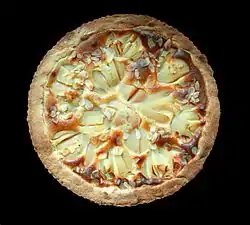パイ
Japanese
Noun
パイ • (pai)
- (mathematics) pi
- Synonyms: (for circles) 円周率 (enshūritsu), (for mathematical products) 相乗積 (sōjōseki)
Usage notes
In Japanese mathematics notation, lower-case π is used to represent the constant of the ratio of the circumference of a circle to its diameter (3.14159265...). Upper-case Π is used to represent a product of a multiplication operation.
References
- 2006, 大辞林 (Daijirin), Third Edition (in Japanese), Tōkyō: Sanseidō, →ISBN
- 1997, 新明解国語辞典 (Shin Meikai Kokugo Jiten), Fifth Edition (in Japanese), Tōkyō: Sanseidō, →ISBN
- 1988, 国語大辞典(新装版) (Kokugo Dai Jiten, Revised Edition) (in Japanese), Tōkyō: Shogakukan
This article is issued from Wiktionary. The text is licensed under Creative Commons - Attribution - Sharealike. Additional terms may apply for the media files.

